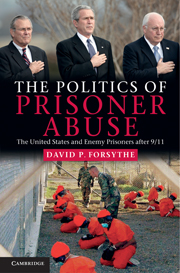Book contents
- Frontmatter
- Contents
- Preface
- List of abbreviations and acronyms
- 1 Torture and political morality in historical perspective
- 2 Political morality and the Bush Administration
- 3 Bush lawyers: the politics of legal interpretation
- 4 The military: Afghanistan, Guantánamo, Iraq
- 5 The CIA: kidnapping, Black Sites, extraordinary rendition
- 6 Due process: detention classification, Military Commissions
- 7 Prisoner abuse and the politics of transitional justice
- Annex A Cast of principal characters
- Annex B Reports on US policy toward enemy prisoners
- Annex C Some relevant legal norms: selected provisions
- Annex D Timeline, selected events, Bush Administration
- Index
- References
2 - Political morality and the Bush Administration
Published online by Cambridge University Press: 05 June 2012
- Frontmatter
- Contents
- Preface
- List of abbreviations and acronyms
- 1 Torture and political morality in historical perspective
- 2 Political morality and the Bush Administration
- 3 Bush lawyers: the politics of legal interpretation
- 4 The military: Afghanistan, Guantánamo, Iraq
- 5 The CIA: kidnapping, Black Sites, extraordinary rendition
- 6 Due process: detention classification, Military Commissions
- 7 Prisoner abuse and the politics of transitional justice
- Annex A Cast of principal characters
- Annex B Reports on US policy toward enemy prisoners
- Annex C Some relevant legal norms: selected provisions
- Annex D Timeline, selected events, Bush Administration
- Index
- References
Summary
Because of [Bush's] decisions, America has squandered much of its global leadership role … This may take a generation to fix, or it may never be fully fixed, in which case the second Bush presidency will mark the beginning of a long-term decline in American status. This didn't have to happen. We need to make some sense of how it did.
(Jacob Weisberg, The Bush Tragedy, New York: Random House, 2008, p. xix)The greatest dangers to liberty lurk in insidious encroachments by men of zeal, well meaning, but without understanding.
(Louis Brandeis, quoted in Joseph Margulies, Guantánamo and the Abuse of Presidential Power, New York: Simon & Schuster, 2006, p. 85)Chapter 1 reviewed the three main positions on the question of treatment of enemy detainees: no major abuse; major abuse as the lesser evil; and selective but controlled abuse. It also showed that progressively into contemporary times the United States had continued to oppose prisoner abuse in public, but had often adopted and propagated the abusive methods of its adversaries in secret. The chapter also noted that liberal democracies like Britain, France, and Israel, among others, had pursued their version of national security in quite harsh ways at times.
- Type
- Chapter
- Information
- The Politics of Prisoner AbuseThe United States and Enemy Prisoners after 9/11, pp. 28 - 59Publisher: Cambridge University PressPrint publication year: 2011

